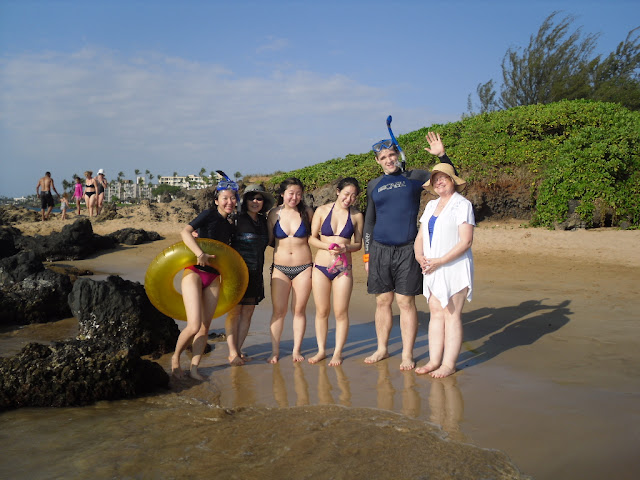My Snorkeling How To Guide
I can't pretend that I'm some sort of crazy snorkeling expert but honestly, there's not a lot to it. The reason I'm putting together this post is because I love snorkeling. And for anyone out there who is afraid to go or is unmotivated to go, I'm hoping this gives you a little push.
First things first, what's snorkeling? Snorkeling is just swimming with a little bit of basic equipment: snorkel, mask, and sometimes fins.

 |
| {from my trip to Turks & Caicos} |

- The snorkel itself is a glorified straw which just gives you access to air while your face is in water. Some newer snorkels have a mechanism that blocks the air tube when it's submerged, preventing you from sucking up water when you breathe.
- The mask is typically much larger than regular swimming goggles - though you could definitely use swimming goggles - and it has a pieces that also goes over your nose. It's supposed to fit nice and snug on your face; a great way to test if a mask is right for you is to place it over your face, without using the straps, and suck in through your nose to create a vacuum. If it sticks, it's great, if not, try a different mask.
- Fins aren't always necessary, though they do help you swim with a bit more aerodynamicism - yeah, that's not a word - they help you move through the water more efficiently. I typically prefer not to use fins because I fear kicking coral - which damages or worse, kills it.
If you've never ever snorkeled before, I recommend you visit a dive shop for a quick overview or go with someone who has experience. It's not a complicated sport but safety is #1. Also, take note of any rules that might be in place for your particular snorkeling location. Some areas have rules that require you to wear a life vest.
If you don't know how to swim, you can still snorkel with the help of a life jacket or inflatable tube or swimmy wings (remember those from your childhood?). And even if you can swim, you may want to use these tools to help you, if you are a bit nervous. During my first time snorkeling, I was quite anxious and I worried about getting tired and drowning even though I am a strong swimmer. But honestly, most of what I did was just float and observe which didn't take much energy. The only major swimming I did was to head out towards the reef and then to head back to shore. It helps to snorkel in calmer waters, not only to reduce the amount of swimming but also for clarity. Also, I've only ever been snorkeling in the ocean and salt water is denser than fresh water which means floating is a bit easier and I think that definitely helped.
If you're nervous about breathing through a snorkel practice a little out of the water, and that'll probably ease your fears. It's not like scuba diving where breathing requires a bit more effort; it's quite easy and natural and you don't need to force it at all and after a while, you forget it's even there. Breathe as normally as possible; don't hyperventilate and don't breathe too deeply. Once you get comfortable, you can also dive a bit deeper into the water and swim like a mermaid. Oh, and a little "au naturel" tip about preventing the mask from fogging up - rub a little spit on the lenses. Sounds nasty but it works.
Should you choose to wear fins, I recommend that you carry them in your hand into the water and then put them on. Walking around on the shore with fins is quite difficult. And if you do wear fins, like I mentioned above, be careful not to kick any coral or other snorkelers around you.
Other things to remember:
- Always swim with a buddy. If you're not with friends or family, make sure you're swimming where there are other people so that should you encounter some sort of emergency, there are people who can help.
- Wear plenty of sunscreen on your back. You spend a lot of time floating on your tummy so your back is exposed to the sunshine almost the entire time and you risk becoming sunburned. Also, be aware of the ingredients in your sunscreen; some chemicals found in sunscreen can be harmful to coral and wildlife.
- Drink plenty of water. Breathing with your mouth open dries you out rather quickly, as does being in salt water and hot sun. Take frequent breaks to drink water, relax, and reapply sunscreen.
- Be wary of any motor sports or sailboats nearby that might accidentally (or purposely) collide with you as you snorkel.
Final notes:
Should you buy your own snorkel or rent one? Personally, I prefer to purchase my own, mostly because of the germ factor. Obviously, rental places clean the mouthpieces, yada yada, but I'm just icked out by using a snorkel that a stranger had in his/her mouth. I buy cheaper kid-size snorkels because 1) they fit my face better and 2) the silicone rubber lining of the mask and snorkel eventually degrade with exposure to the sun and salt and so after a few years of use, they need to be replaced. The cost of the cheaper kid-size snorkels is pretty comparable to a typical week's snorkel rental. If you are only going for one day and don't think you'll ever go again, rent.
Wow, really anxious for warm weather and snorkeling in Belize!
Cheers.



Comments
Post a Comment